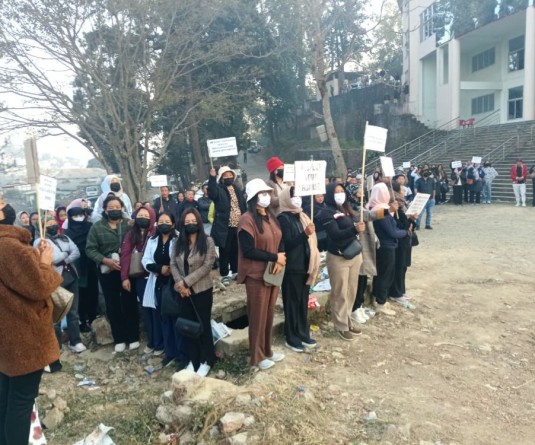
High incidence of cancer in Tamlu area due to improper mining practices, says Kikon
Morung Express News
Kohima | March 1
The revenue generated from coal mining in the state during the fiscal year 2023-2024 was Rs 34, 142, 645 crore, compared to Rs 9, 91, 82, 730 crore in 2022-2023. This indicates a significant plummet to a tune of Rs 6, 50, 40, 085 crore.
MLA Achumbemo Kikon raised concerns about this massive revenue deficit, stating that the revenue should have increased from one fiscal year to the next, but instead, there has been a decrease, resulting in a significant loss for the government.
Deputy Chief Minister TR Zeliang, speaking on behalf of the Chief Minister, explained that the state has been producing coal for many years, but has struggled to fetch a good price in the market due to high sulphur and ash content, despite having high calorific value. Additionally, he said the issue of varying royalty collection is still ongoing and that the exact gap amount of royalty collected during the year will be known by the end of March 31.
Clarifying on the revenue deficit, Zeliang said in 2022-2023, there was a sudden demand for coal in the energy sector due to limited imports imposed by the Ministry of Coal, Government of India, resulting in an increase in demand for domestic coal, including Nagaland coal, and consequently, an increase in revenue. However, in the fiscal year 2023-2024, the coal demand in the domestic market decreased due to adequate coal stock made by various energy sectors in the previous season.
Furthermore, he maintained that the recent general election held in Bangladesh in January 2024 and the limited quantity of coal imported from Indonesia and the USA at cheaper rates have also impacted the demand for Nagaland coal in the domestic market. Bangladesh, he informed is one of the major consumer of Nagaland coal.
Hence, Zeliang justified that the demand and supply of Nagaland coal have been affected. However, he expressed optimism that the market, both domestic and export, will be more conducive in the coming months.
Meanwhile, Kikon expressed concern on the implications, including revenue loss, environmental effects, and the destruction of flora and fauna due to coal mining. He highlighted the lack of scientific knowledge and methods of coal mining in the state, with random mining practices leaving the land barren.
Kikon also mentioned the high incidence of cancer among residents in the Tamlu area, which he believes is linked to improper mining practices, and calls for stringent regulations and stronger criteria for obtaining mining licenses.
Supporting Zeliang’s argument, Minister Temjen Imna Along chipped in that coal rates are very low, with a surplus of coal in stock that cannot be sold for more than Rs 4500 per metric tonne currently.
At the same time, he suggested on the establishment of government-authorized depots in each area to regulate the coal market effectively, and that coal mining licenses are only issued to individuals with a substantial capital of about Rs 4-5 crore in their accounts stating that some non-residents are not paying the GST incurring huge loss to local license holders.
Along also emphasized on the need for capacity building by the department to educate the local population about coal mining practices and suggested for streamlining revenue generation to ensure the state receives Rs 50-100 crore from mining activities.






